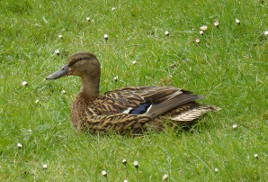GAIA is an incredibly effective Belgian organisation working for animal rights. Over the years, they have managed to achieve changes both in the legislation and culture of their country, and in support of international campaigns.
Sadly, one of Belgium’s long-standing problems in the area of animal welfare is the production and consumption of foie gras, in which it is second in the world after France.
Foie gras consumption increases steeply during the Christmas period: ironically, God’s gift to humanity is celebrated by torturing many of His harmless creatures.
In an attempt to combat this dreadful trade, in December 2014 GAIA produced a TV advert in which Belgian celebrities try to sing a Christmas carol with a funnel stuck in their throat. You can imagine the result. The message is clear: if even a quick superficial insertion of a funnel in their mouth causes gagging and discomfort, how inhumane it is to force long funnels down the throats of ducks and geese several times a day over a period of 12 to 21 days in order to shoot huge quantities of maize into their stomachs, thus causing their livers to swell (they must weigh at least 300g and 400g respectively to be used for foie gras production). These miserable animals are then killed so their sick livers can be blended with spices in order to produce what is sold as a ‘delicacy’. Most animals are even kept in individual cages, where they are unable to walk, stretch their wings or perform the most basic natural behaviours.
Most people around the world would never buy or eat foie gras, but the minority that does so is sustaining a market based on extreme suffering.
Good news arrives from time to time though: the most symbolically important of the more recent positive developments is probably the Flemish Parliament’s decision in December 2014 to ban foie gras from the menus of its restaurants and canteens.
Furthermore, the largest food chain in Norway, Norgesgruppen, which holds around 60% of the market for everyday commodities in the country, came to the decision that it would no longer sell foie gras. This applies to all the company’s food outlets, which should mean that access to foie gras has been greatly reduced for Norwegian customers.
Among the highlights of this period, we should remember that the animal-friendly alternative to foie gras produced by GAIA is now being sold by the largest supermarkets in Belgium, and that a growing number of foie gras producers are rejecting force-feeding in favour of less harmful alternatives.
Recently, GAIA asked me to join their campaign against foie gras and to coordinate on their behalf some actions in other countries, particularly trying to have an impact on legislation and achieve higher protection for ducks and geese wherever possible.
More news will be regularly published both on this website and on GAIA’s website.
Free subscription to the AnimalWelfareAndTrade Newsletter: click here
Follow AnimalWelfareAndTrade on Twitter: click here
Follow AnimalWelfareAndTrade on Facebook: click here


